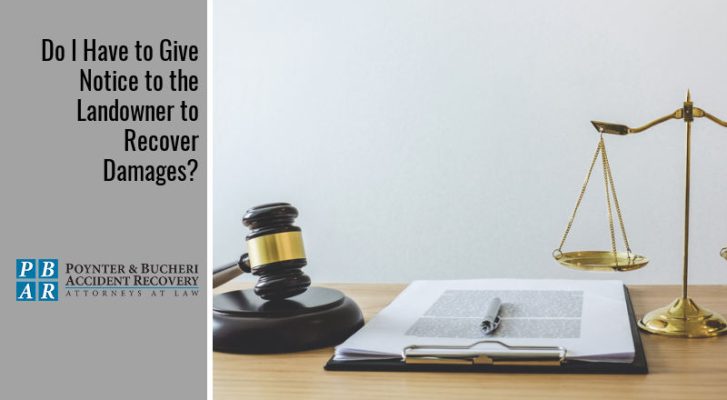
Do I Have to Give Notice to the Landowner to Recover Damages?

If you slip and fall or get hurt on someone else’s land or property in any other way, the landowner must have had notice of the hazard that caused the accident for you to recover damages. This situation is known as a premises liability case. Land and property owners do have a responsibility to keep their premises, land, or property safe, but in legal terms, the word “notice” can be interpreted in different ways and can make recovering damages tricky.
If you have questions or concerns about a premises liability case, it is best to consult with a local Indianapolis personal injury attorney. Working with an attorney ensures you have someone advocating for your rights who can help you prove that proper notice was given so you can get the compensation you deserve.
Landowners Owe You a “Duty of Care”
When dealing with a premises liability case, the first thing you should understand is that land and property owners owe their guests, visitors, customers, etc., a duty of care. This means they have a responsibility to address known hazards to keep their property safe. However, the tricky part of handling these kinds of cases is dealing with the terms “known hazard.”
Essentially, the landowner must have been given “notice” of the hazard and a reasonable amount of time to deal with it before they can be held liable. If the landowner claims they did not know about the hazard that caused the accident, they could potentially be free of any liability. However, they cannot simply claim ignorance.
The landowner having “notice” of the hazard does not necessarily mean you needed to have physically told them about the hazard before you got hurt. It means they needed to have known about the hazard or should have known based on their own levels of reasoning.
Guests Must Prove Notice to Recover Damages
Basically, you must prove that there was a notice of the hazard to recover damages. This means when you file a claim, you must be able to prove that the landowner should have known about the dangerous condition, or they actually knew about the dangerous condition and had a reasonable amount of time to handle it but did not.
It is the landowner’s responsibility to keep their property safe, yes, and there are situations where they should have figured out that a hazard existed and dealt with it. However, in premises liability cases, the landowner will likely try to defend themselves, which is why the injured party must be able to prove that there was a notice of the hazard in order to win their case and recover damages.
Actual vs. Constructive Knowledge
Notice in a premises liability case is viewed in one of two ways: actual knowledge of the hazard and constructive knowledge of the hazard. It is your job as the injured party, or plaintiff, to prove that the landowner had one of these two types of notices.
- Actual knowledge: Actual knowledge means that the landowner has to have known or did actually know about the dangerous condition. This basically means that they knew because they physically saw the hazard themselves.
For example, if the landowner sees that there is a broken step or a loose handrail because they walk up the steps themselves every day, they actually know about the hazard and have a duty to take care of it in a reasonable amount of time.
- Constructive knowledge: Constructive knowledge means the landowner should have known or that they would reasonably be expected to know about the dangerous condition. In this case, the landowner might not have seen or been told about the hazard, but they should have known of its existence based on basic reasoning and deductive skills.
For example, if they know it is supposed to snow overnight, they are not expected to stay outside and remove the snow as soon as it falls, but they should know that when they wake up in the morning, there will be snow on their property that could cause someone to slip and fall and they should deal with it in a reasonable amount of time.
Proving Actual or Constructive Notice
Proving that a landowner had either of these two types of notices can be challenging. It requires investigation and information that can be used as evidence. Evidence can include statements from the defendant and plaintiff, documents, video surveillance or photographs, inspection reports, and witness statements.
Generally, to prove actual notice or knowledge of a hazard, you must typically get the landowner to admit that they knew about the issue. Proving constructive notice can be trickier. In either situation, you will need the help of an attorney to guide you through the process and help you gather evidence to support your claim.
Poynter & Bucheri Accident Recovery — Indianapolis Personal Injury Attorneys
If you or a loved one are injured on someone else’s property or land, the experts at Poynter & Bucheri can help. We have years of experience handling premises liability claims and know what it takes to prove that the landowner had sufficient notice. Our team of experts is dedicated to assisting our clients to ensure they get the compensation they deserve.
Don’t hesitate to reach out — one of our experienced attorneys can assist you right away. Call 1-800-265-9881 for a free case review.
